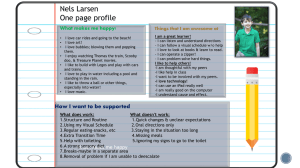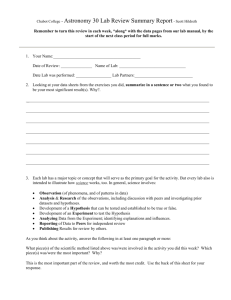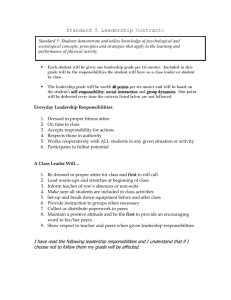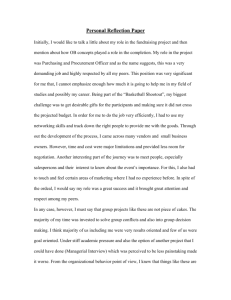Referral to Community Partners Behavioral Health Pre-Intake Form: Family Perspective
advertisement
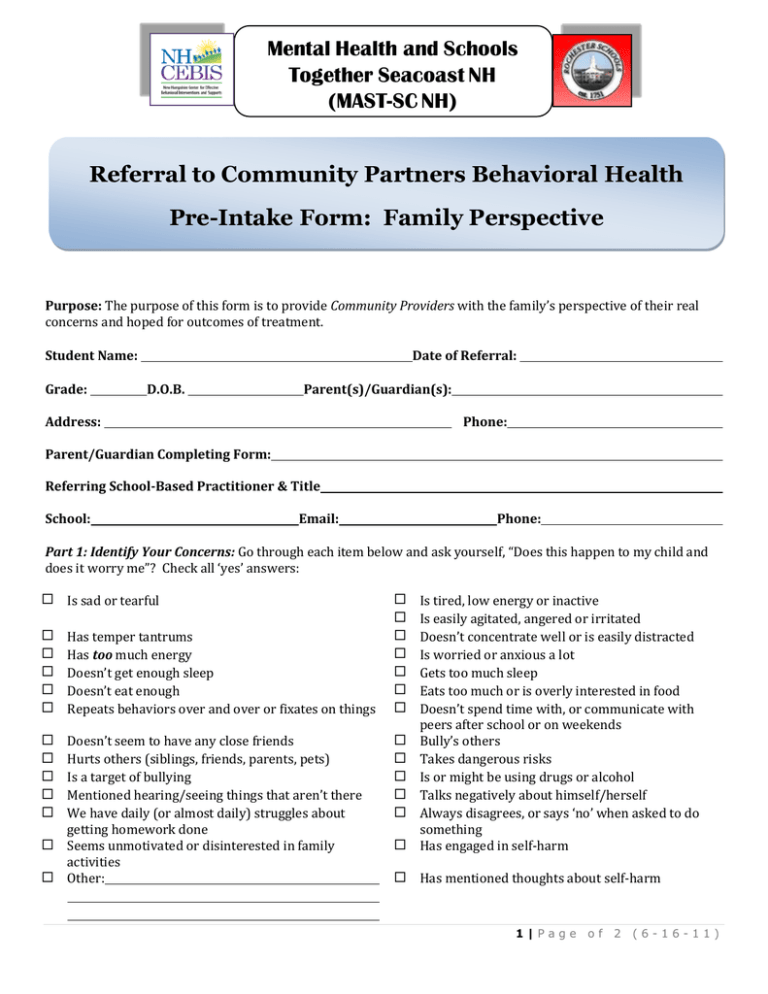
Mental Health and Schools Together Seacoast NH (MAST-SC NH) Referral to Community Partners Behavioral Health Pre-Intake Form: Family Perspective Purpose: The purpose of this form is to provide Community Providers with the family’s perspective of their real concerns and hoped for outcomes of treatment. Student Name: Grade: Date of Referral: D.O.B. Parent(s)/Guardian(s): Address: Phone: Parent/Guardian Completing Form: Referring School-Based Practitioner & Title School: Email: Phone: Part 1: Identify Your Concerns: Go through each item below and ask yourself, “Does this happen to my child and does it worry me”? Check all ‘yes’ answers: Is sad or tearful Has temper tantrums Has too much energy Doesn’t get enough sleep Doesn’t eat enough Repeats behaviors over and over or fixates on things Doesn’t seem to have any close friends Hurts others (siblings, friends, parents, pets) Is a target of bullying Mentioned hearing/seeing things that aren’t there We have daily (or almost daily) struggles about getting homework done Seems unmotivated or disinterested in family activities Other: Is tired, low energy or inactive Is easily agitated, angered or irritated Doesn’t concentrate well or is easily distracted Is worried or anxious a lot Gets too much sleep Eats too much or is overly interested in food Doesn’t spend time with, or communicate with peers after school or on weekends Bully’s others Takes dangerous risks Is or might be using drugs or alcohol Talks negatively about himself/herself Always disagrees, or says ‘no’ when asked to do something Has engaged in self-harm Has mentioned thoughts about self-harm 1|Page of 2 (6-16-11) School Concerns: Seems unmotivated or disinterested about school Low grades or low academic performance Sudden change in school performance Is Isolated Has trouble socially in school Other (please explain): In ‘trouble’ a lot at school Problems completing homework Late to school or absent a lot Gets picked on or teased Gets in fights Over the past 3 to 6 months, is there any change in how your child is behaving or feeling? Yes No difference Have there been changes in the family or any family-related events (or other types of events) that could explain how your child is behaving or feeling? Yes (explain): Not that I know of Would you like a school person to provide information to Community Partners about the school’s perspective of how your child is doing in school? Yes Not at this time If Yes, who would be the best person (or people) to provide the information? Part 2: Identify Outcomes for Treatment: Go through each item below and place a check on what you are hoping for as a result of treatment at Community Partners Home Is less mad at me (or at someone) Is happy or ‘OK’ more often (less sad or tearful) Talks in more positive ways about himself/ herself (or less negative) Fewer or shorter tantrums or angry outbursts Says ‘Yes’ or ‘OK’ more often when asked to do something (or just does what is asked) Is more agreeable about getting homework done (fewer struggles) Abstains from drugs or alcohol Eating regularly and more healthily Is less frustrated or angry or irritated Is calm more often (less worried or anxious) More stable mood (not so hot and cold) Getting along better with family members (specify) More socially engaged (having more fun with peers; communicating positively with peers) Gets to school more often and with less struggle Less involved in risky or unhealthy behavior Sleeping regularly and normally School Improved school attendance Fewer reports of problems at school More socially engaged (having more fun with peers; positive communications with peers) Less socially isolated Other (please explain): On-time for school Improved grades More participation in fun or interesting after school activities Handling emotions (sad, frustrated, worried, angry) better in school 2|Page of 2 (6-16-11)
